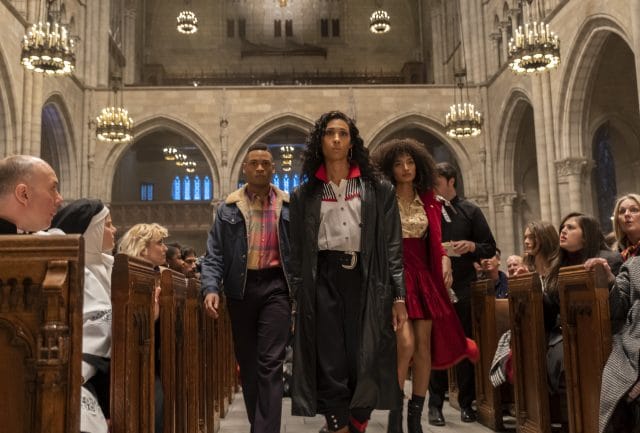
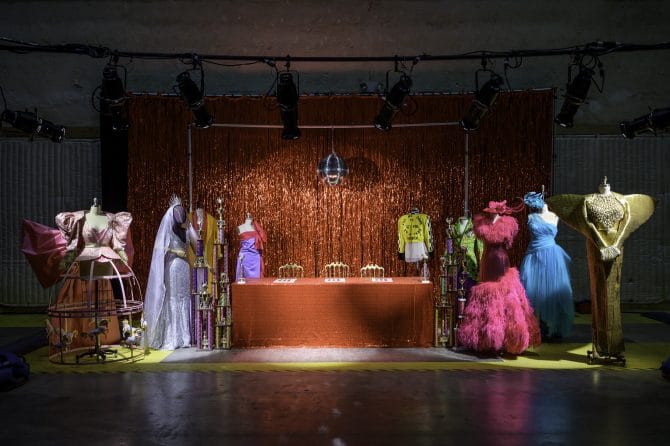 POSE — CR: Jeffrey Neira/FX
POSE — CR: Jeffrey Neira/FX
On a misty New York City morning, a party bus drove a gaggle of entertainment writers to a remote area of the Bronx where a pair of soundstages keep creative vigil amid the industrial sprawl of warehouses, plants, and factories.
We knew we’d found the right place by the few cast members dressed in their colored costumes standing outside for a break—much like the soundstages, a splash of color in an area teeming with gray. None of us there that day quite knew what to expect from our visit, or just how profound the conversations of the day would dive.
Inside a barren and chilly stage, a sampling of some of the series’ most iconic costumes greeted us in silence. We had just enough time to enjoy a cup of coffee and examine some of the fabulous looks: a pink evening gown worn by Blanca (MJ Rodriguez), a yellow taxi sweater sported by Pray Tell (Billy Porter) and a hot pink ballgown featuring a moving carousel in place of a hoop skirt. The production team had also set up a faux judges’ table, complete with sparkling background, to help exhibit the looks.
After just a few minutes admiring the costumes, we looked up to see co-creator Steven Canals enter the room in a purple suit, flanked on either side by two of the series’ head writers, Our Lady J, and Janet Mock.
“I’m forever indebted to Ryan for putting his power behind this show,” Canals says. We settle in around a circular folding table draped in a black tablecloth set up for us by the crew. “The initial kernel of an idea came to me in 2004 as an undergrad. I wrote that first draft 10 years later working on an MFA in screenwriting at UCLA. I spent two years pitching it in and out of offices and being told ‘No.’ Initially, with very coded language—’It’s too urban, too niche’—to ‘Who will play these characters?’ to ‘It’s too black. It’s too brown.’ It was a show Hollywood didn’t want to make.”
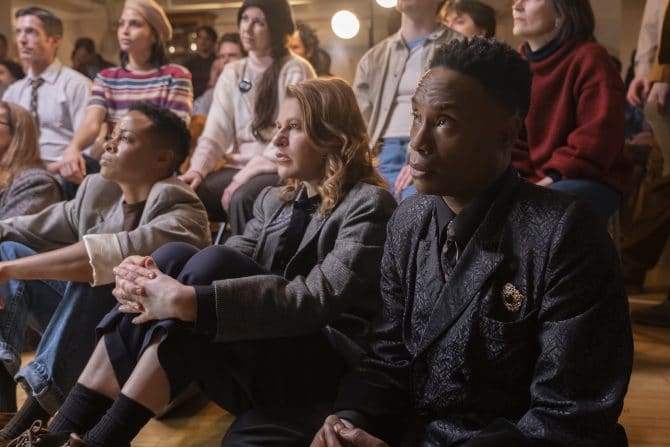
Pose features one of the most ethnically diverse casts on television, and features storylines plucked from queer history. The drag ball scene of the 1980s spawned documentaries like Paris is Burning and Madonna’s song “Vogue,” but somehow the essence of the balls—which attracted an almost all-queer, non-white following, especially among transgender folk—had gone mostly overlooked by the Hollywood mainstream. That was until Pose came along, featuring one of the largest casts of transgender performers, writers and directors ever assembled.
“Ryan, at his core, believes in equality and equity,” Canals explains. “He said, ‘This show is going to be made.’ A show like Pose required a disrupter. And that’s what Ryan is. He likes to shake sh*t up.”
We point out to Canals that the show has already changed television and offered queer people a whole new kind of media representation, and new stories of their cultural and political heritage. “I’m trying hard to ensure, at least in my own voice and advocacy, an environment in Hollywood that is more inclusive of marginalized groups,” he says. “I think we’re getting there.”
A noble sentiment, to be sure, but of course Hollywood still has a long way to go. Pose can’t do it alone.
“For me, what’s been the most rewarding, and the most healing is that I’m able to help create reflections and images that I never had,” says Janet Mock, coming over to join us.
The longtime author and transgender rights advocate has played a crucial role in the creation of Pose, joining the writing staff, producing the show, and even wading into directing. In the first season, she accomplished a landmark breakthrough, becoming the first transgender woman of color to write and direct a television series.
“For me,” Mock adds, “the most rewarding part of directing and writing is being able to be the first person on the call sheet next to MJ Rodriguez, our number one. That’s rare. I can bring the voices of all the women I grew up with and all the women I saw in Paris is Burning, I can bring their lived experiences to the screen.”
We try to press the team for a few details on the plot of the upcoming season. They giggle with Mona Lisa smiles, unwilling to give much away.
“This season we delve even further into having HIV/AIDS. We dive deep into AIDS activism,” Mock offers.
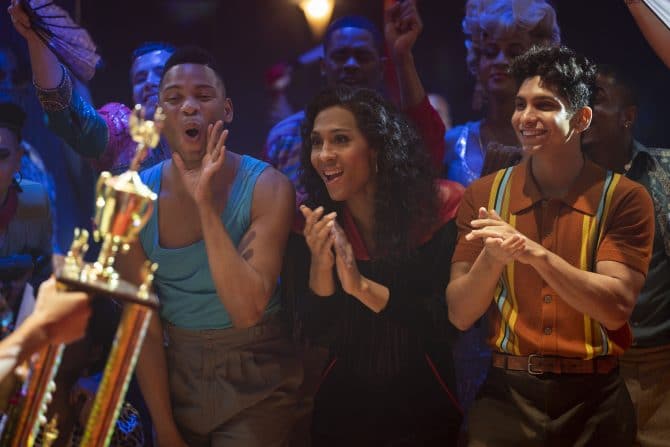
“The first moment is when ‘Vogue’ comes out,” Our Lady J elaborates. She wears a white silk dress, with her red curls piled up on her head, looking a bit like the goddess Athena. “I’m excited for the viewers to learn about the activism at the time. So much is so dark right now, and so difficult for so many people. Something that happened in the generations that came before us, especially in the LGBTQ community, was they really used their anger to move and bring about change. So I hope people can see how they can be agents of their own change, how they can use a difficult and hostile environment to inspire that anger.”
As the three sat and chatted with us, another discreet figure entered the room, dressed in a ski jacket and beanie stocking cap.
Ryan Murphy walks over to join us, having come directly from shooting a key ballroom scene.
“Tell them I need 10 minutes,” Murphy says to a nearby PA. We press him for plot details, which he refuses to disclose. When it comes to an overall outlook for the season, Murphy opens up considerably more.
“This show, more than any other I’ve ever done, has a beginning, a middle, and an end,” Murphy says, sounding almost philosophical. “I always wanted to show the end around 1995-96 because that’s the year the HIV medications came out and stopped the plague. I wanted to do a story about a community under siege, and how do you find hope and joy when everyone you know is dying.”
Now 53, Murphy remembers the promise of queer liberation in the 1970s and the subsequent setbacks of the AIDS crisis from first-hand experience. We ask him that eyewitness memory helped inspire Pose. He sits quiet a moment, deeply considering the question.
“In 1988-89-90, I was really just coming of age,” Murphy explains. “I remember every time I went to do an HIV test, I would say ‘God, if I can just live, I’ll do whatever it takes.’ I would make this bargain that every time I would go and get a test I would do another year of services at an HIV anonymous call center. So I did that for a long time. I would take the calls from people who were contemplating suicide, or they were being shunned, or they were afraid of telling their parents. It was very dark and very upsetting. I guess I’ve been reliving that experience.”
“I remember the culture of that time: the late ’80s people were just shocked,” Murphy recalls. “The early ’90s, I was involved in protest groups. I remember people getting really, really, really mad. I remember just feeling like if we could just hold on, something good would happen. And it took six years for those drugs to become available. And I remember all that devastation. All that loss. All that sadness. And I was a person of privilege, make no mistake. I was living in Washington, DC and Miami and then I moved to LA. But I was in it. I was putting a lot of those feelings in. And I lost a lot of friends. So I’m writing about that feeling. It was dark and bleak and upsetting…but oddly hopeful. We had fun and we celebrated and we memorialized.”
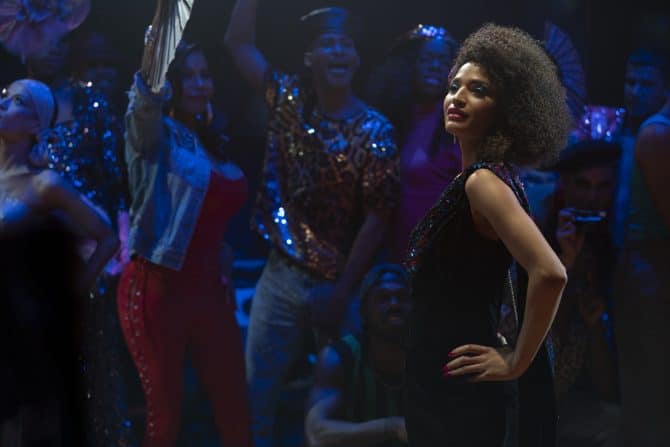
“I want to keep the memory alive,” he declares, adding to his previous thought. “It was really important to me.”
Murphy springs up from his seat, tossing his coffee cup in a nearby trashcan. “Are you coming to watch?” he asks, moving toward the soundstage door.
Production coordinators escort us to an adjacent stage, between other sets still under construction and to a very familiar back staircase. We climb the steps to the second floor and find ourselves looking down over the light rail on the main ballroom set. Background extras clad in drag, mesh tank tops and tight shorts mull about waiting for the scene to begin. Down below on the main dance floor, dancers warm up with a few voguing moves and some breakdancing steps. We can see most of the main cast there as well—Dominique Jackson, MJ Rodriguez, Indya Moore, Angelica Ross and Billy Porter all stand around waiting for cameras to roll. Well, all but Jackson anyway, who, we’re told, sprained her ankle shooting an earlier scene in heels. She gets to sit for the day to hide her brace.
Ryan Murphy re-enters the set, shedding his jacket under the hot studio lights. He gives some direction to Ross and Porter as well as the main cameraman to prep the scene. Meanwhile, the production coordinators instruct we the media to stay a few steps back behind the balcony edge, so as not to look out of place should a camera catch us while rolling. A few moments pass, then the magic happens. Cameras start rolling, the cast takes positions, and Murphy calls “Action!”
We watch the scene unfold over about a 30 minute period. In it, Candy (Ross) confronts Pray Tell (Porter) in a heated argument. Murphy has the actors perform about four takes of the scene, stopping to give them more instruction each time.
We stand mesmerized by the action, even getting into the scene a bit ourselves, hooting and snapping with the extras. Eventually, the production pauses to move to a new camera set-up, and a PA comes to escort us off the stage. Production designer Jamie Walker McCall greets us, leading us on a tour of the remaining sets. We get a chance to walk around the House of Evangelista apartment, examining the detail and decoration, and discover the “secret passages” where production can open the walls to allow for camera setups. We also walk through the Hellfire Club, a sex dungeon set which features prominently in the news season. McCall shows a special pride in the Hellfire set, which her team has decorated with various sex toys and intricate furniture.
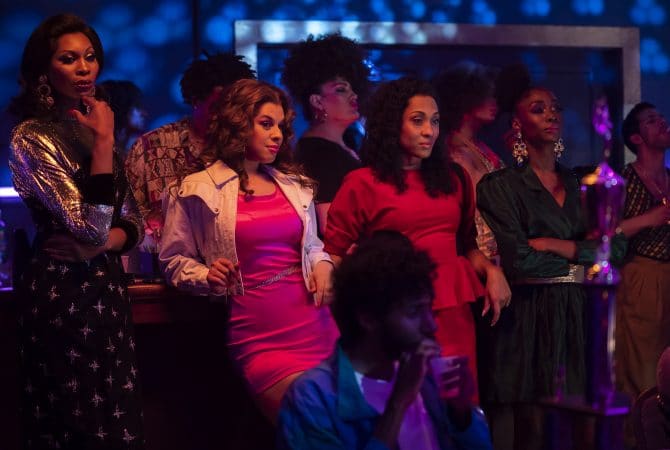
Back on the vacant soundstage, most of the main cast enters to introduce themselves: MJ Rodriguez (Blanca), Indya Moore (Angel), Dominique Jackson (Electra), Hailie Sahar (Lulu), Ryan Jamal Swain (Damon), Dyllón Burnside (Ricky) and Angel Bismark Curiel (Lil Papi) all greet us, still dressed in their costumes of the day.
Rodriguez sits down next to us. Of course, we probe her for some tidbits about the new season as well, but just like everybody else, she stays mum. One thing she does bring up, however: her own experience with the AIDS crisis, how it affects her performance, and how it figures into the authenticity of the series.
“Unfortunately and fortunately—it’s kind of both—I have had people [affected by the AIDS crisis] in my life,” Rodriguez admits. “My mother had people like that in her life. People who just left. Her closest friend who she was raised in kindergarten with until the time she was 27 years old, he died of HIV. [My mom, who worked in a hospital] found out about her diagnosis when she saw that he was on her floor. It’s insane. It’s moments like that where you realize that this is going on. She said she saw people she never would expect come in one day and leave the next completely different.”
“I grasp on that,” she adds. “I did my research.”
“The show means life to me,” Sahar adds, almost glowing. “I’ve lost friends to HIV and things of that nature, so having an opportunity to be part of something like this is life to me. It’s my life. I get to portray my experience on camera, and hopefully touching other young people out there.”
“I came from the ballroom culture,” she continues. “I discovered it when I was underage. I was homeless at the time. I didn’t think I had the support system that I do. I relied a lot on friends who have passed on, but I cherish those moments. I look back on it now and I think had I not had that sense of family, who’s to say I would be here? Family is who you love, and who loves you. It’s not about who’s in your bloodline. And I’ve grown to really appreciate that and understand that and honor that.”
Across the table, Indya Moore gives in a warm laugh. She grins a radiant smile at Sahar.
“I relate to Miss Hailie’s story,” Moore declares. “I think what contributed to my homelessness and what contributed to my foster care was my family, by religious law or ideal or belief, they misconceputalized the way I experienced my gender, or my identity, or who I was. And I got my ass beat. We all got our ass beat, know what I’m saying? I got beat real bad, and I ended up in foster care.”
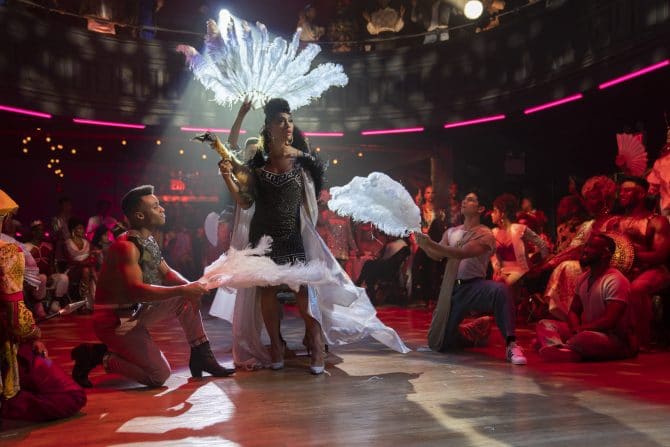 POSE — “Worth It” — Season 2, Episode 2 (Airs Tues, June 18, 10:00 p.m. e/p) Pictured (l-r): Mj Rodriguez as Blanca . CR: Macall Polay/FX
POSE — “Worth It” — Season 2, Episode 2 (Airs Tues, June 18, 10:00 p.m. e/p) Pictured (l-r): Mj Rodriguez as Blanca . CR: Macall Polay/FX
We realize we’re all holding our breath as we listen to Moore’s story. “All my siblings, we all got our ass beat,” Moore explains. “But my beatings were unique because it wasn’t just about stealing or lying or talking back. It was, ‘Stop standing with your hand on your hip.’ It was behavior. This is a lot of our families, you know, religious families with gay kids. A lot of this is indoctrinated in belief systems that are generational. So I ended up in foster care. Chosen family, navigating finding that was really tough because I moved from foster home to foster home a lot. I wanted to have a stable component of chosen family. For those of us who were lucky enough to find a space or a group of people that were actually there for one another no matter what, that helped me to survive.”
“Have you forgiven them?” we ask her.
“Absolutely,” Moore says without hesitation. “I mean, it’s a generational issue. My family had to forgive their family too. I think their intentions…you know, we mean well but we still cause harm. My family did intend to protect me. They loved me very much, and that’s why I ended up in the position that I did. I don’ t think it’s necessarily their fault because they thought that they were being spiritually righteous. They wanted me to have access to God. They thought that queer behavior would block me from having access to God. That was the brunt of the issue. I love my family. I know they love me. I totally forgive them.”
“The one thing I want people to understand,” Dominique Jackson chimes in, “is that we’re human beings. Some of the reactions I’ve seen that have been the most prominent have been, ‘Oh my God, I did not know that you guys went through this also.’ We have this thing in society where we suffer in silence and don’t speak out. It’s not just about Pose. We’re in an era right now where everyone is starting to come forward and say, ‘I matter. My life matters.’ It’s high time we started to remove ourselves from taught toxicity where women believe they are subservient and men believe that they are the ones in power, and trans people believe the only thing they can do is sex work. We have a lot of these myths to debunk.”
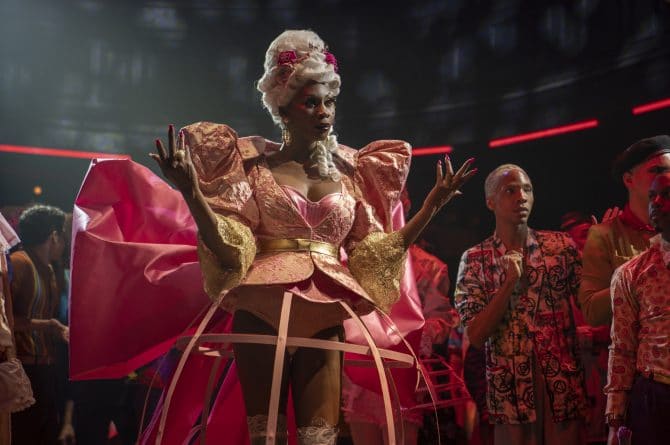 POSE — “Acting Up” — Season 2, Episode 1 (Airs Tues, June 11, 10:00 p.m. e/p) Pictured: Dominique Jackson as Elektra. CR: Macall Polay/FX
POSE — “Acting Up” — Season 2, Episode 1 (Airs Tues, June 11, 10:00 p.m. e/p) Pictured: Dominique Jackson as Elektra. CR: Macall Polay/FX
“Everyone’s been hurt,” Sahar observes. “Everyone’s longed for something. Everyone’s cried about something. Everyone’s longed for family and friendship and love. The subject matter might be different, but the human characteristics this show portrays humanize everyone and bring everyone together. That’s what the ultimate goal is. We’re all here on this planet. We were all children at one point. We all used to play together. We didn’t see color. We didn’t see gender. We just saw friends. I think that’s what the show does.” She shrugs. “Hurt people hurt people. Even someone like Donald Trump—everyone was a child at some point. Somewhere along the way, people get hurt, and they end up hurting people. But I still believe light can cast out darkness. Anything is possible. I’m sitting here today. Anything is possible.”
We ask Sahar about the gratitude she feels, having come so far in her life.
“It makes me cry. It’s that thing where you just look at your life full circle in a sense. And everything makes sense now. I realize now why I went through those hard times, particularly. Those times where I had nowhere to live, nothing to eat. They make sense now because the universe and God knew that I would be able to come full circle and be able to portray that on camera and be authentic in it. I cry because I’ve lived it, and I’m portraying it, and I know there are other people that are going to be blessed by that. I cry because I can’t believe it. I’m sitting here with you guys and I can’t believe it.”
“After we started this show,” she goes on, “I was sitting one day and I said, ‘Oh my gosh, oh my gosh.’ I knew that this was a great opportunity. I knew that this was a blessing. But it wasn’t until my supporters…”
She freezes, suddenly choked up. She reaches out her hand as if offering an apology. We give it a gentle squeeze.
“It wasn’t until they reached out to me and started telling me that they had a reason to live, and they had hope,” Sahar says, regaining her composure. “Once that clicked, and I said, ‘This is really, really saving lives,’ not just changing the industry. This is changing the world. And I’m part of it. It’s a blessing.”
A production coordinator walks onto the stage, calling the actors to the set. We thank them for chatting with us and watch as they stride off the soundstage. Moore lingers a moment, stopping to admire the costumes on display. Suddenly, she jumps up on the table.
“Baby come here, let’s take a picture!” she says, motioning to us. Who were we to argue?
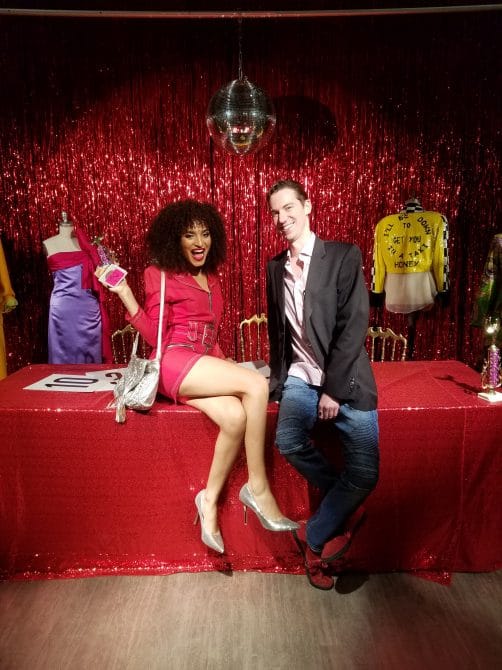
By that time, the hour had grown late, though the day did hold one last surprise. No sooner had Moore and the rest of the cast left than two more familiar faces entered the room.
Angelica Ross and Billy Porter, both still in costume and giggling like longtime friends, join us at the table. Ross shares a story about their relationship.
“I was in middle school, and they were doing a production of Grease,” she recalls. “And they thought they were being progressive by doing blind casting. They cast me as teen angel, but they only got that idea because they saw someone on Broadway—a black person in a wild outfit and hair—and they showed this to me. This was a while ago. And I became a ham in that role. I never knew until we were in a different interview and Billy was talking about that role. I was like, ‘That was you!’ It was a full 360. Those people you inspire or those people who are signposts on your journey.”
“I’m old enough to be a signpost,” Porter quips, triggering laughter in the room.
We ask about the response the show has received, especially for its portrayal of transgender characters.
“For people who don’t know us, for people who don’t know trans people, who don’t know the community, sometimes the perspective or story they get is all gloom and doom,” Ross says.” We’re talking about homelessness. We’re talking about unemployment. We’re talking about murder of transwomen which isn’t stopping anytime soon. There was another one just a few weeks ago. There was the murder of a trans woman, Ashanti Carmen, and nobody’s talking about it. What’s really important for people to understand—and this is something Pose does beautifully—the life of trans people of color, and LGBTQ people of color, may be filled with a lot of challenges. It may be one out on the street. Sometimes it may even be lonely. We have learned how to make beauty out of the challenging spaces, out of our lives. That’s what Pose does. We wipe our eyes, and we go out on the floor.”
“I was watching Oprah as I am want to do,” Porter interjects. “It was before I could afford therapy, and it was like, ‘Oh wait, she’s saying something I need to hear.’ And she and Maya Angelou and I think Iyala Vanzant were talking about service. When your intention is service, everything else will work itself out. And here I am in show business and I’m like, ‘OK, how can I be of services to something other than my own ego and bank account in a business that is inherently narcissistic?’ It’s like you need some version of ego just to survive. How does that happen? And the ton of bricks hit me. ‘Oh right. Everyone is trying to tell me that I can’t do anything unless I act like a straight man.’”
Porter shakes his head. “And by ‘straight man,’” he continues, voice rising, “it means their version of what a straight man should be. Their version of performed masculinity. Black masculinity. Toxic masculinity put on me. It’s actually not about masculinity. It’s about, ‘We know you’re gay, so you’ll never be allowed to live up to our version of masculinity.’ From the minute that I could comprehend thought, my masculinity was in question. It wasn’t until that moment 20 years ago I realized I don’t need to be fixed. I’m fine just the way I am.”
We ask why queer authenticity frightens so many people—something the show dealt with in its first season.
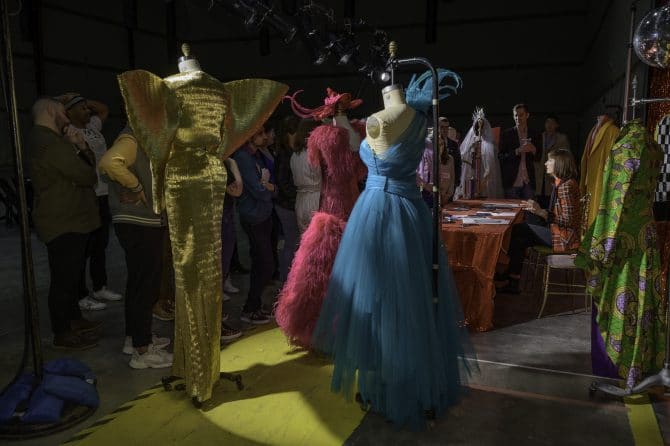 POSE — CR: Jeffrey Neira/FX
POSE — CR: Jeffrey Neira/FX
“I don’t know,” Porter confesses. “I really don’t know.” He recalls the reaction to his wearing a dress to the Oscars this year. “It was all about my attack on masculinity. ‘It’s an attack on masculinity’—Tomi Lahren. Or from the black community—it’s like I have some agenda. I don’t understand why it matters.”
“I’m a work in progress,” Porter admits, tone grave. “I’m so enraged about everything that’s going on in the world right now. I’m trying to find some grace. I don’t have grace right now. When we’re sitting in a cesspool of corruption, talking about it. We’re sitting around round tables for years talking about whether or not this motherf*cker is a liar or a racist or a cheater. Who doesn’t have to show up for a subpoena? Where’s the ‘lock him up?’ I don’t know what’s going on, so I don’t have the grace to talk about it without it sounding full of venom.”
Angelica sighs, nodding in agreement with his rage.
“We have something called ‘pay it;’ it’s an old African trans proverb,” she explains. “Pay it. It just means, girl, whatever the price is for this experience, pay it. It is what it is. That’s another African trans proverb: ‘it is what it is.’”
We about having Murphy, a white man, as producer for a show centered around a community of people of color? Is that cultural appropriation?
“The black people wouldn’t do it,” Porter booms.
“Right,” Ross says. “Period.”
“The white man showed up when the black people would never look at it!” Porter exclaims.
“And who’s going to call that out?” Ross queries. “Us! Because we’re black. Because we can. We hold both of those things. As black, queer, LGBTQ people, we can wrap this all up. We have a calling right now to get our folks together.”
“He’s the one that showed up, and look at how he did it,” Porter insists. “Look at how he did it.”
“Consulting from every angle,” Ross agrees. “My make up artist is trans.”
“Every piece of his money goes to organizations,” Porter says with gusto. “He ain’t making no money from this. Let’s talk about that. There’s a right way to be an ally.”
“I’m so thankful,” Porter muses, “that not only am I a part of the generation that kicked the door down. I have lived long enough and been blessed enough to walk through that process.”
Across the room, a production coordinator appears.
“We gotta run,” Ross laments. We thank her and Porter for chatting with us and giving us so much to think about.
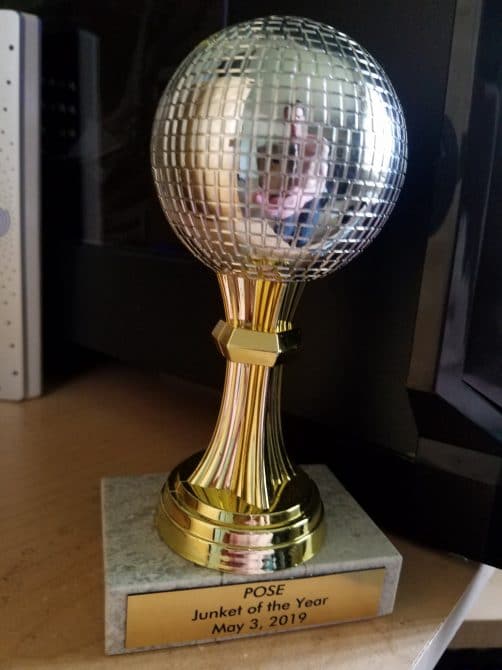
As we pack our notebooks and recorders to head back to the bus, the PR team appears to present us with a trophy, made to look like one from the show with the date engraved across the bottom. We stop and look at it a moment, exhilarated by the day. We realized that Pose has already changed the lives of everyone involved with it, not to mention millions of viewers around the world who are finally learning about a vital bit of queer history, and who might see themselves on screen for the first time.
And we felt changed too, hearing the words of love and gratitude embodied by the show echoed in the words of the creative team. In a time of toxicity, a show about perseverance, community, authenticity and love might just offer the right antidote.
Halie Sahar put it most succinctly:
“Love is pure, love is kind, love is understanding. Love is simple. Love is family.”







